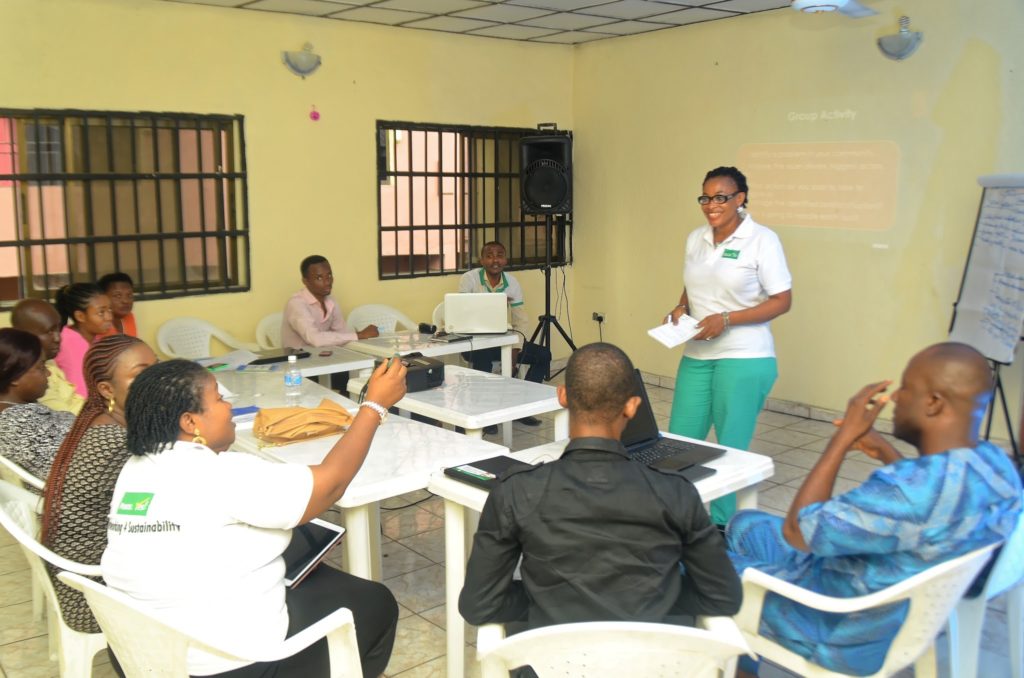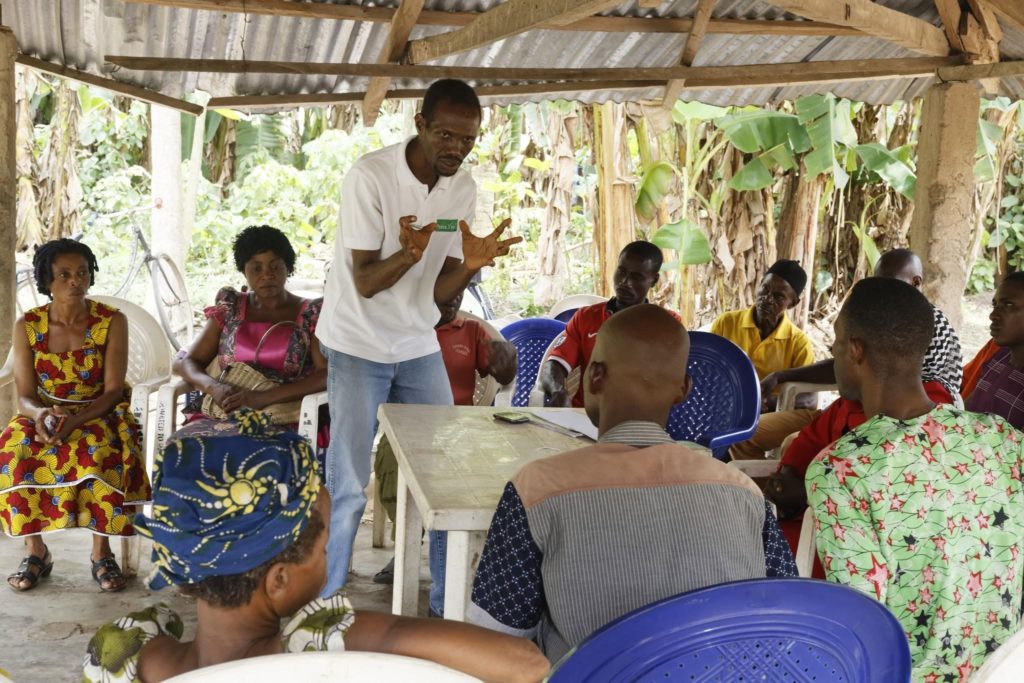
Loretta Ahuokpeme, P4P (Rivers State)
I am a peace-loving person, and I came to realize that without peace there’s no cohabitation. There’s a lot of issues with people trying to tolerate one another. It’s becoming a problem, even in nuclear families. I am part of Our Lady of Perpetua, a religious organization that tries to make people live peacefully with each other. Then I got invited for a P4P training in Owerri, Imo State, I really liked it.
Chilos Godsent, P4P (Imo State)
P4P came in and had an introductory stakeholder meeting in Owerri, Imo State, in 2013. There, I learned about the network and started attending the meetings as a member. We did elections, started interventions, and interacting with other states.
With P4P, we saw the link between peace and progress. I have been a development worker for many years and understanding the destructive effect of conflict.
Mekunusi, P4P (Bayelsa State)
I am not used to volunteer work, but I happen to be someone with a passion for it. If I can be part of a system, I don’t even need to be in front and leading, but I want to be part of changing our narrative. There’s a project we did in a community. The result was very good, I saw the smiles on the faces of people that had been at loggerheads. They were smiling and laughing. My major motivation is results. I like seeing result of peace built.
On what influences conflict in communities where they work:
Loretta:
It’s a variety of things. Sometimes the conflict are about resource-sharing, sometimes it is boundary issues, leadership issues, also marginalization.
For me personally, I didn’t see women’s participation in many communities where leadership on peacebuilding is formed. I tell them it’s not possible to do peace building without women. That is the issue with culture and belief. Women themselves believe they should not be part of decision-making in their communities. Why? They’ll tell you that men can’t sit together with the women. I keep asking the girls, “why would you not come out when the issues are brought up?” I tell them that what happens in their community concerns them. If you don’t see yourself as a stakeholder, it’ll be a bigger problem for them. We lack mentorship. If we mentor our young people, they’ll understand that they are smart and make contributions that benefit the community.
Chilos Godsent:
The post-election scenario gave us more things to engage in. Different political interest came to fore post-election, and there was unwillingness of different parties to accept defeat. We needed to bring all the rival interest together. It affected us, because post-election violence is different from community violence. We had to go the extra mile to ease conflict as a result.
Mekunusi, P4P
What we are working on is still a spillover from the elections. This youth leadership elections, the fallout of the guber elections, every community leadership election was politicized as a result of the national election fallout. All those involved hold their alliances very strongly. Even in my community, the rivalry of the parties plays out.

Chilos Godsent (standing) facilitates a P4P mediation meeting in Ohaji Egbema in Imo State. Such meetings are among the means through which his chapter of P4P work to bring communities together in peace
What kind of work are involved in and what are your challenges?
Chilos Godsent:
Being a chairman of the PREVENT team is like being a reverend father. You have to live a guided life and be a role model. Everywhere you go, you must promote peace. We have been dealing with cult clashes and intra-communal fights. We also have to deal with Eze chieftaincy tussles, where govt often gets involved by trying to impose candidates. We also get involved in local level stuff where neighbors fight. Cult clashes are a big deal in Imo State, because in many places you have conflict entrepreneurs who foment conflict for political godfathers. Otherwise, they go into kidnapping and robbery.
In most cases we try to conduct trainings to improve local governance in these communities. We try to institute a governance framework. We have been putting those in place in these communities where we intervene. Many of the Ezeship crises is about lack of institutional framework. There’s no place people can go to grievances, and people can turn to violence as a result. We also train them on negotiation and dialogue, so that they can use these tools when they are aggrieved.
Mekunusi, P4P
Accessing the creeks, which are the focal points of oil and gas activity in state can get expensive. From Yenagoa to Brass alone is 4,000 naira each way. So yes, funding is a major issue. For this reason, we are stronger in Yenagoa, but we need to train people who are already posted there to ease conflict there.
Loretta:
The PREVENT team has been everywhere, but they can’t be everywhere. The calls bombard them everyday, and they can’t attend to them alone, so we still need a lot of support. And not just the PREVENT team, everyone that is part of P4P, should be able to support at all times. These are volatile areas.
On PIND’s influence
Chilos Godsent:
80-90% of our progress is PIND, because they trained us and gave us funding to enable us do what we do. If PIND had not been here, we couldn’t have gotten the resources to get what we want. Some community people also know PIND projects. People always ask who sent us, and we tell them it’s PIND and they calm down and let us work. They listen to us.
Mekunusi:
The trainings and assessments are quality! I mean, all the work that we have done is because we were trained by P4P. I have facilitated for two NGOs since I’ve gotten training from PIND on things that I did not have knowledge of before. The success of the PREVENT team is because we applied the skills they shared with us. Another reason for our success so far is the commitment of the active members of P4P.
Loretta:
So many people have called wanting to partner and engage us, and all our partnership and funding took off from PIND. It is through the training that enables us do what we currently do. So PIND has played a greater role. Beyond PIND, there are people in P4P that have the passion. They put in their resources and their time and material resources, everything, to make sure these interventions hold.
Big Lesson Learned
Loretta, P4P
The practices and lessons learned differ according to different communities, but one thing I’ve found is that everyone wants peace. That’s one thing I have found out. All of us want peace. But peace keeps eluding us because of misunderstandings, and there are people who are ready to listen to you.
Mekunusi, P4P
I have learned to do a SWOT (Strength, Weaknesses, Opportunity, and Threats) training for everything now!
Chilos Godsent:
To be a P4P member, you must be a good listener and must be patient and tolerant. This work has influenced me in that way. Being a PREVENT chairman has also taught me you also have to be a leader or potential leader, which means you have to listen.